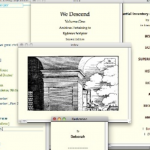Descending into the Archives: An Interview with Hypertext Author Bill Bly
Brian Davis, Bill Bly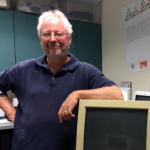
Here we transcribe an extended conversation between hypertext author Bill Bly and Ph.D. candidate Brian Davis that began in January 2018 at the Maryland Institute for Technology in the Humanities (MITH), home to The Bill Bly Collection of Electronic Literature. They discuss Bly's long-term electronic hypertext project, We Descend, Archives Pertaining to Egderus Scriptor (1997-present), as well as the history of electronic hypertext and hypertext theory, the technological challenges of born digital writing and archiving, book-archives and archival poetics, and the value of innovative writing and deep reading amidst the current century's "hodgepodge," "higgledy-piggledy" social media.
Monstrous Weathered: Experiences from the Telling and Retelling of a Netprov
Alex Mitchell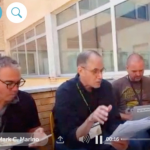
A consideration of Monstrous Weather, a recent netprov (or networked improvisation) and the ways that collaborative storytelling encourages the rereading, retelling, rewriting, and adaptation of stories that begin as performances, and then turn into a form of archiving through still further rereading, rewriting and retelling. Author Alex Mitchell begins by depicting how, during the original performance of Monstrous Weather, there was a constant reworking, remixing and retelling of texts, both literally and through references and embellishments. This process gradually coalesced the loose collection of story fragments into something that had a kind of coherence, if not as a story, then at least as a storyworld. Mitchell discuss two particular performances/remixes: a live reading of excerpts from the netprov performed at the Electronic Literature Organization (ELO) Conference 2017 almost exactly 1 year after the initial performance, and a subsequent hypertext remix/archive.
An Mosaic for Convergence
Charles Bernstein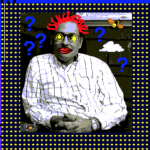
An Mosaic for Convergence, Charles Bernstein's hypertext essay from ebr Issue 6 in the Winter of 1997-1998, explores the ramifications of a literature that is not structurally challenged, but structurally challenging. By then, Bernstein could sense a shift in literary sensibility, where it was beginning "to seem as natural to think of composing screen by screen rather than page by page." That was a few years after the flourishing of hypertext, but before the internet made reproduction of our print corpus a dominant practice (as e-books, primarily, with very little print/screen interplay or reader/author/programmer interchange). The moment Bernstein describes, and its instantiation on ebr's Alt-X legacy site, seems to the ebr editors something worth preserving - if only as a measure of recognized literary possibilities that have not been realized.
Bernstein's essay is the first of many that will be recovered by ebr co-editor Will Luers, and re-produced in the journal's version 7.0 (circa 2018-2019).
Suspended Poetics: Echoes of The Seven Odes in Arabic E-Literature
Babak Elahi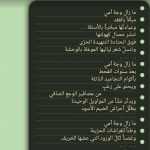
Babak Elahi shows how electronic literature in its public display, its interactivity, and its paradoxical combination of ephemerality and permanence brings us closer to the ancients than to the moderns - and closer still to the collective ritual experiences that Arabic and Muslim literature always valued over Western individualism. Further still, the emergence of Arabic e-lit does not just mean inclusions of still more cultural or ethnic identities. The politics of identity is yet another Western concern that an online Arabic poetics is happy to leave behind.
Room for So Much World: A Conversation with Shelley Jackson
Scott Rettberg, Shelley Jackson
Rettberg's and Jackson's interview, and their creative work's direct engagement with environments anticipate the themes in a forthcoming ebr gathering by Eric Rasmussen and Lisa Swanstrom, titled Natural Media. More than just an articulation of environmental 'issues,' the creative work of Jackson and Rettberg actively integrates snowfall in Brooklyn, tattooed skin on bodies, pollutants in Jersey City and New Orleans (post-2012), and other particles and particulars that are touched by natural and medial ecologies.
This conversation is published as the fourth in a series of texts centered around the publication of The Metainterface by Søren Pold and Christian Ulrik Andersen. Other essays in the series include: The Metainterface of the Clouds, Always Inside, Always Enfolded into The Metainterface: A Roundtable Discussion. and Voices from Troubled Shores: Toxi•City: a Climate Change Narrative.
Algorithm, Thought, and the Humanities:A Review of Unthought: The Power of the Cognitive Nonconscious
Daniel Punday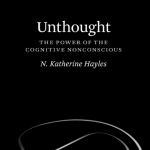
Cognition, as we've known for quite some time, is much larger than consciousness. And that realization can help explain literature's longtime, productive fascination with the unconscious. But today, when a scholar such as N. Katherine Hayles connects "nonconscious cognition to a wide range of technical, financial, and literary issues," we are set to fundamentally rethink the "nature and value of the humanities today."
Essays from the Arabic E-lit Conference
Dani Spinosa
This gathering by Dani Spinosa provides ebr readers with a glimpse into the discussions and debates at the 2018 Arabic E-lit Conference in Dubai.
Sound at the Heart of Electronic Literature
John F. Barber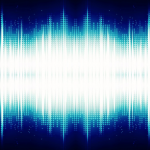
In this essay, John Barber argues that sound suggests a new and valuable way of approaching and considering Arabic electronic literature. Based on the oral histories of Arab cultures, the use of sound in Arabic electronic literature provides a way of knowing and being in a literary world, real or imagined. Sound makes readers re-think their relational experiences with others, with themselves, and the spaces and places they inhabit. These shifting relationships promote interesting opportunities for Arabic electronic literature.
Towards Gestural Specificity in Digital Literature
Serge Bouchardon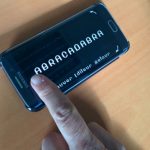
In this essay, Serge Bouchardon looks to electronic literary and its important predecessors in a way that prioritizes gesture and manipulation. Bouchardon interrogates how technology alters and opens the way that literature can be materially engaged-with by its readers, a way that deliberately encourages its readers to engage physically and agentially with the text. In this way, Bouchardon reveals a way of critiquing electronic literature that expands upon the physically-engaging properties of print.
Mapping Electronic Literature in the Arabic Context
Reham Hosny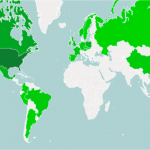
In her essay, Egyptian elit scholar Reham Hosny observes and quantifies the ways that Arabic electronic literature has been historically underrepresented in the predominant critical venues like the ELO's Electronic Literature Collections and other central repositories for the dissemination and study of e-lit. Rather than simply observing this vacancy, however, Hosny proposes real, practical methods for addressing and bridging this discrepancy, bringing new works to light and encouraging translation, open access, and consideration of the language-based and nationalist biases in the scholarship surrounding elit.
Always Inside, Always Enfolded into the Metainterface: A Roundtable Discussion
Scott Rettberg, Christian Ulrik Andersen, Søren Bro Pold, Lisa Swanstrom, Elisabeth Nesheim
At the moment when post-fictional fictions, essayistic fictions, and design fictions emerge as a cultural dominant, Rettberg, Swanstrom, Nesheim, Anderson and Pold discuss an emerging "aesthetics of infrastructure." Quietly condoned, mostly unnoticed installations of "Camouflaged Cell Concealment Sites" are now being visited by artists such as Betty Beaumont and Trevor Paglen. When our cloudy digital industries are so busily constructing cell phone towers that look like pine trees or Saguaro cactuses (sort of), the role of literary and visual artists may be simply to document these found fictions - for as long as they don't get arrested.
This conversation is published as the second in a series of texts centered around the publication of The Metainterface by Søren Pold and Christian Ulrik Andersen. Other essays in the series include: The Metainterface of the Clouds, Voices from Troubled Shores: Toxi•City: a Climate Change Narrative and Room for So Much World: A Conversation with Shelley Jackson.
Literary Readers in Cognitive Assemblages
Dani Spinosa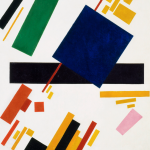
Dani Spinosa, who edited and introduced the Dubai gathering, endorses Hayles' position on the collaborative, cognitive, and (not least) communal potential of human-computer co-authorship.
Including E-Literature in Mainstream Cultural Critique: The Case of Graphic Art by Khaled Al Jabri
Doris Hambuch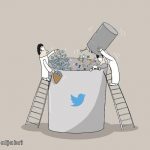
In this essay, Doris Hambuch uses the image-based work of Arabic cartoonist Khaled Al Jabri to address concerns of technological dependence to reconsider our use of screens. Rather than simply reprimanding readers about the potentially negative dependence of our contemporary society on technology and its screens, Hambuch instead proposes that we look to Al Jabri's work as a way of reconsidering the role of the screen in visual poetics and graphic literature.
Electronic Literature in Ireland
James O’Sullivan
O'Sullivan's essay appears at about the same time as a post to the Electronic Literature Organization list, revealing details of the Summer 2019 ELO Conference & Media Arts Festival, to be hosted by O'Sullivan at University College Cork, Ireland: http://elo2019.ucc.ie/
